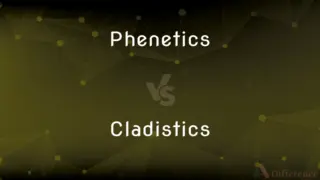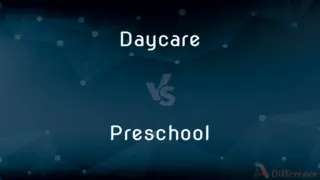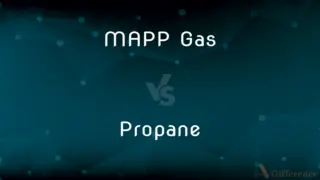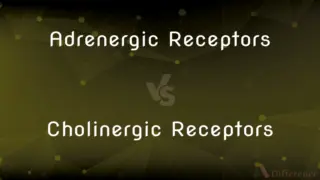Identifier vs. Variable — What's the Difference?
By Tayyaba Rehman & Maham Liaqat — Updated on March 16, 2024
An identifier is a name given to elements in a program, whereas a variable is a type of identifier that stores values.

Difference Between Identifier and Variable
Table of Contents
ADVERTISEMENT
Key Differences
Identifiers serve as the names for various programming elements like variables, functions, and classes, acting as a reference to these entities within the code. They are fundamental in the structure and readability of programs, allowing developers to label elements with meaningful names. On the other hand, variables are specific identifiers that hold data values which can change during program execution.
While identifiers are chosen names and follow certain naming conventions and rules specific to the programming language, variables are defined by not just their names but also by the values they hold and their data types.
In the context of a program's scope, an identifier can represent various elements, including variables, but it doesn't inherently hold a value. It's the symbolic name for a memory location. Variables, by contrast, are directly associated with memory locations that store data values. This means that when a variable is defined, a space in memory is allocated to hold the value of that variable, linking the identifier to a tangible piece of information.
Identifiers are static in the sense that once defined, they simply refer to a specific element and do not change throughout the program. Their primary purpose is identification and readability. Variables are dynamic, designed to hold different values at different times during the execution of a program. This dynamic nature allows for programming flexibility and the ability to perform calculations, store user input, and more.
Comparison Chart
Definition
A name given to programming elements
An identifier that stores values
ADVERTISEMENT
Role
Naming and referencing elements
Storing and manipulating data
Types
Variables, functions, classes, etc.
Integers, strings, booleans, etc.
Value Association
Does not hold a value
Holds and can change values
Dynamic/Static Nature
Static (name doesn't change)
Dynamic (value can change)
Compare with Definitions
Identifier
Identifiers can represent variables, functions, classes, and more.
In Java, MyClass could be an identifier for a class.
Variable
A variable is an identifier that stores data values that can change during the program's execution.
In JavaScript, let age = 30; defines a variable age storing the value 30.
Identifier
An identifier is a name given to elements in a program for identification.
In Python, total_sum can be an identifier for a variable storing the sum of numbers.
Variable
The naming of variables follows the conventions and rules of the programming language.
In Ruby, variable names are usually written in snake_case, like total_score.
Identifier
Identifiers follow specific naming conventions of the programming language.
In C++, identifiers cannot start with a number.
Variable
Variables are associated with specific data types like integers, strings, and booleans.
In Python, is_valid = True defines a boolean variable is_valid.
Identifier
Identifiers are static, meaning they refer to the same element throughout their scope.
If userInput is an identifier for a variable, it will always refer to that variable in its scope.
Variable
Variables are allocated memory space to store their values.
Declaring int score; in C allocates memory for an integer value.
Identifier
The choice of identifier names can affect the readability and maintainability of the code.
Using numberOfStudents as an identifier is more descriptive than n.
Variable
The value of a variable can be updated throughout the program.
In C, counter = counter + 1; updates the value of the variable counter.
Identifier
An identifier is a name that identifies (that is, labels the identity of) either a unique object or a unique class of objects, where the "object" or class may be an idea, physical countable object (or class thereof), or physical noncountable substance (or class thereof). The abbreviation ID often refers to identity, identification (the process of identifying), or an identifier (that is, an instance of identification).
Variable
Likely to change or vary; subject to variation; changeable.
Identifier
To establish or recognize the identity of; ascertain as a certain person or thing
Can you identify what kind of plane that is? I identified the man at the next table as a famous actor.
Variable
Inconstant; fickle.
Identifier
(Biology) To determine the taxonomic classification of (an organism).
Variable
(Biology) Tending to exhibit genetic variation or variation in a physical trait
Geographically variable color patterns.
Identifier
To ascertain as having a certain characteristic or feature
Job candidates who are identified as overqualified.
Children who have been identified with hearing loss.
Variable
(Mathematics) Having no fixed quantitative value.
Identifier
To consider as identical or united; equate
The Greek god Ares is identified with the Roman god Mars.
Variable
Something that varies or is prone to variation.
Identifier
To associate or affiliate closely with
Writers who are identified with modernism.
Variable
(Astronomy) A variable star.
Identifier
To consider oneself as sharing certain characteristics or attitudes as another
She identifies strongly with her grandmother.
Variable
A quantity capable of assuming any of a set of values.
Identifier
To associate oneself with or admire something, such as a set of ideas
A language learner who identifies with a new culture.
Variable
A symbol representing such a quantity. For example, in the expression a2 + b2 = c2, a,b, and c are variables.
Identifier
Someone who identifies; a person who establishes the identity of someone or something.
Variable
Able to vary or be varied.
Variable winds or seasons; a variable quantity; a variable resistor
Identifier
Something that identifies or uniquely points to something or someone else.
Variable
Likely to vary.
Identifier
One who identifies as a particular type or role; one who says and believes that they are a certain thing.
Variable
Marked by diversity or difference.
Identifier
A guidebook that helps determine the specific class of an object (such as a mushroom, herb, fish, bird, drug, or mineral), or its individual identity (such as that of a star).
Variable
(mathematics) Having no fixed quantitative value.
Identifier
A formal name used in source code to refer to a variable, function, procedure, package, etc. or in an operating system to refer to a process, user, group, etc.
Variable
(biology) Tending to deviate from a normal or recognized type.
Identifier
(HTML) A code that distinguishes a particular element from all other elements in a document.
Variable
Something that is variable.
Identifier
(databases) A primary key.
Variable
Something whose value may be dictated or discovered.
There are several variables to consider here.
Identifier
A symbol that establishes the identity of the one bearing it
Variable
(mathematics) A symbol representing a variable.
Variable
(programming) A named memory location in which a program can store intermediate results and from which it can read them.
Variable
(astronomy) A variable star.
Variable
(nautical) A shifting wind, or one that varies in force.
Variable
Those parts of the sea where a steady wind is not expected, especially the parts between the trade-wind belts.
Variable
Having the capacity of varying or changing; capable of alternation in any manner; changeable; as, variable winds or seasons; a variable quantity.
Variable
Liable to vary; too susceptible of change; mutable; fickle; unsteady; inconstant; as, the affections of men are variable; passions are variable.
Lest that thy love prove likewise variable.
His heart, I know, how variable and vain!
Variable
That which is variable; that which varies, or is subject to change.
Variable
A quantity which may increase or decrease; a quantity which admits of an infinite number of values in the same expression; a variable quantity; as, in the equation x2 - y2 = R2, x and y are variables.
Variable
A shifting wind, or one that varies in force.
Variable
Something that is likely to vary; something that is subject to variation;
The weather is one variable to be considered
Variable
A quantity that can assume any of a set of values
Variable
A star that varies noticeably in brightness
Variable
A symbol (like x or y) that is used in mathematical or logical expressions to represent a variable quantity
Variable
Liable to or capable of change;
Rainfall in the tropics is notoriously variable
Variable winds
Variable expenses
Variable
Marked by diversity or difference;
The varying angles of roof slope
Nature is infinitely variable
Variable
(used of a device) designed so that a property (as e.g. light) can be varied;
A variable capacitor
Variable filters in front of the mercury xenon lights
Common Curiosities
What is an identifier?
An identifier is a name given to programming elements like variables, functions, and classes for identification.
Can an identifier be a variable?
Yes, a variable is a specific type of identifier that holds data values.
What is a variable?
A variable is a type of identifier used to store data values that can change during the execution of a program.
Is the value of a variable constant?
No, the value of a variable can change during the program's execution, which is why it's called a "variable."
Can the name of an identifier change during program execution?
No, the name of an identifier remains constant throughout its scope in the program.
Do identifiers always hold values?
No, identifiers do not inherently hold values; they serve as names for elements. Only variables, which are a type of identifier, hold values.
How do naming conventions for identifiers vary?
Naming conventions for identifiers vary by programming language and can include rules about starting characters, case sensitivity, and allowed characters.
What role do data types play in defining variables?
Data types specify the kind of data a variable can hold and how it can be used, impacting memory allocation and operations.
Are all identifiers variables?
No, not all identifiers are variables. Identifiers can also represent functions, classes, and other elements in a program.
What types of values can a variable hold?
Variables can hold various types of values, including integers, strings, booleans, and more, depending on the programming language.
Why is choosing meaningful identifier names important?
Meaningful identifier names improve code readability and maintainability, making it easier for others to understand the purpose of various elements.
Can variables have the same name in a program?
Variables can have the same name if they are in different scopes; otherwise, it leads to a naming conflict.
How does the scope of an identifier affect its accessibility?
The scope of an identifier determines where within the program the identifier is recognized and accessible.
What happens when a variable is defined in a program?
When a variable is defined, memory is allocated for it to store its value, and it is associated with an identifier.
How do variables contribute to dynamic programming?
Variables allow programs to store and manipulate data dynamically, enabling interactive and flexible software behavior.
Share Your Discovery

Previous Comparison
Cam vs. Tappet
Next Comparison
Irony vs. HypocrisyAuthor Spotlight
Written by
Tayyaba RehmanTayyaba Rehman is a distinguished writer, currently serving as a primary contributor to askdifference.com. As a researcher in semantics and etymology, Tayyaba's passion for the complexity of languages and their distinctions has found a perfect home on the platform. Tayyaba delves into the intricacies of language, distinguishing between commonly confused words and phrases, thereby providing clarity for readers worldwide.
Co-written by
Maham Liaqat














































